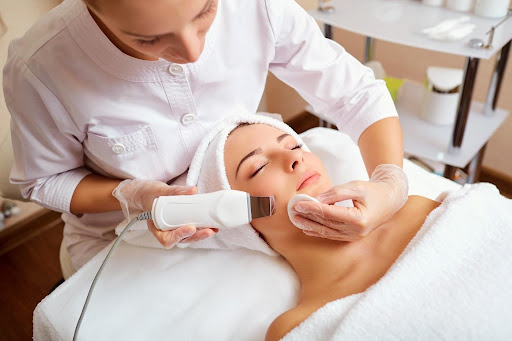The History of Cosmetology
Using medicinal raw materials to maintain and improve overall well-being was practiced in many ancient civilizations in India, China, and Egypt. Egyptians were the first who discovered the antiseptic and healing properties of spices and essential oils and used them in their well-advanced medicinal practices and daily hygiene, as found in Ebers papyrus. Today’s scientific and practical cosmetology is rooted in these ancient practices, which have been developed and advanced over many years.
What Are Different Types of Cosmetology Services?
Contemporary cosmetology not only focuses on taking care of the human body and improving its attractiveness but also promotes a healthy lifestyle with the aid of appropriate physical activities, well-balanced diets, and awareness of external stimuli and harmful factors that may threaten your overall health and well-being. The studies have revealed that beauty salons are suitable places to improve clients’ awareness and educate them about various chronic and acute health conditions such as skin, breast and cervical cancer, diabetes, and menopause (reference). The following topics are commonly discussed between the cosmetologist and clients during a treatment session in a beauty salon:
-
Diet/weight control
-
Exercise
-
Stress management
-
Healthy Aging
-
Pregnancy/motherhood
-
Sun exposure
-
Smoking
-
Medical care
-
Chronic illness
-
Cancer screening
-
Health behaviors (vegetable and fruit intake, water consumption, and physical activities)
-
Menopause
-
Prevention of infant mortality
-
Skin cancer prevention
-
Diabetes education
Cosmetologists as a skin health promoter
A cosmetologist can be considered a health promoter when it comes to skin health and care. A cosmetologist’s professional duties include the approaches and activities that will result in early diagnosis and prevention of skin cancer by educating you about the harmful factors which trigger or accelerates skin malignancies and the methods to prevent or slow down the process.
 Overexposure to ultraviolet (UV) radiation from artificial sources or sunlight is the major player in the formation and development of skin cancer, including squamous cell carcinoma, basal cell carcinoma, and melanoma. Apart from that, educating the client about UV protection methods is another helpful strategy that can be taken to decrease the incidence of skin-related disorders and diseases.
Overexposure to ultraviolet (UV) radiation from artificial sources or sunlight is the major player in the formation and development of skin cancer, including squamous cell carcinoma, basal cell carcinoma, and melanoma. Apart from that, educating the client about UV protection methods is another helpful strategy that can be taken to decrease the incidence of skin-related disorders and diseases.
An essential element of UV protection is having proper behavior during sunlight exposure to minimize the amount of radiation reaching the skin by shortening the time spent in the sunlight, especially during the summer, wearing protective clothing, and applying sunscreen formulations. It is worth noting that sunscreen preparations should protect you against UVA and UVB radiation, cause no allergic reaction, and be waterproof and non-toxic.
In addition to topical protection against sunlight and photoaging, systemic and oral photoprotection approaches also play a vital role in reducing the harmful side effects of exposure to UV rays. It has been shown that natural antioxidants such as vitamins C, and E, carotenoids, and plant extracts rich in polyphenols can effectively reduce the harmful adverse effects of exposure to sunlight by minimizing and diminishing DNA damages caused by reactive oxygen species during the exposure to the sunlight (You can read more here about the role of antioxidants in sun protection).
Cosmetology and Early Detection of Skin Cancer
The cosmetologists will also pay attention to the alarming and unnatural skin lesions on your body and may suggest a consultation with a skin specialist or dermatologist. This will accelerate the process of diagnosis of malignant changes on the skin and helps the treatment of the malignancy in the early stages of progression, resulting in lower mortality rates due to skin cancer (read more about early detection of skin cancer).
In a study entitled “Talkin’ About Better Sking (TABS),” cosmetologists’ knowledge, preparedness, and motivation to talk about skin cancer signs, symptoms, and early diagnosis after participation in a 2-hr educational program were assessed. The results showed that five months after implementing this pro-health program, 89% of cosmetologists talked to their clients about their skin health, such as protection against sunlight and the proper sunscreen applications. In addition, 63% of cosmetologists spoke to their clients about the suspicious skin lesions on their bodies and successfully referred them to a specialist for further examinations.
In conclusion, the pro-health activities conducted by a cosmetologist in the beauty salons can help raise their clients’ awareness about their health, especially their skin health, and motivate them to adopt a healthy lifestyle and undertake healthy behaviors. It has been shown that a cosmetologist is a suitable person to act as a health educator due to their knowledge in the field and access to a wide range of populations (you can read more here about the role of cosmetology in health).
At Centre of Wellness, we offer a full range of online beauty courses taught by founder Claire Coleman, with over 25 years of experience in beauty procedures, natural health, and massage. Now you can learn about cosmetology online, flex-time, and from any location. You’ll learn via comprehensive theory books, step-by-step written instructions, and hands-on procedural training videos.
